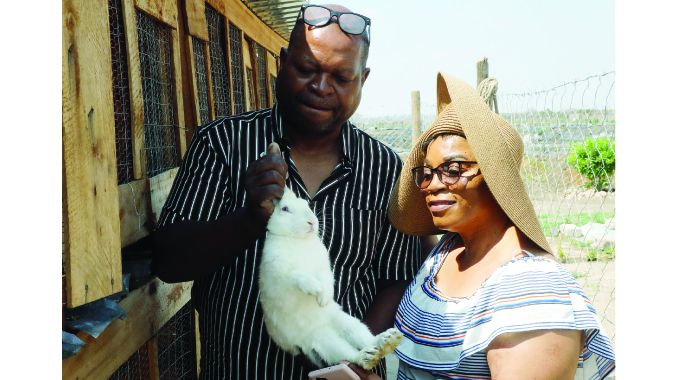The Chronicle

Bongani Ndlovu, Chronicle Reporter
MR Martin Nyoni and Ms Fattela Nleya run a 3,5-hectare plot in Village Six, Heaney Junction estates along the Bulawayo-Harare highway.
The plot has various farm produce, such as rabbits, layer chickens, fish, tomatoes, cabbages, green pepper, lettuce and beetroot.
Their plot is going towards self-sufficiency as the fresh produce subsidises the livestock and vice versa. The rabbits, besides the pellets that are bought to feed them, rely on the cabbage and lettuce leaves that are produced as excess from the plants.
When the produce is mature, what is also interesting with their concept is that, the couple’s plot has fresh farm produce that supplies their two restaurants and retail shop that is situated in the city. They adhere to the tenets of value addition as their farm produce has a ready market that can consume it.
The fish that amount to 9 000 are fed by fish feed and subsidised by the manure produced by the nearly 300-layer chickens and the rabbits.
When mature the fish are supplied to various shops around the city.
There are five fish ponds on the property with one 20 metres, by 30 metres and 1,5 metres deep being functional as Mr Nyoni said it was a relatively new project.
A former nurse, Mr Nyoni said he teamed up with his partner Ms Nleya three years ago, bought the plot and as their first project planted cabbages.
“We started the project about three-and-a-half years ago. What inspires us is seeing other farmers achieving different things. This land was barren and after tilling the land, we put 7 000 cabbages and we managed to harvest. But unfortunately, we had planted at the wrong time, and the cabbages were flooded in the market, and we ended up selling them at US$1 for, four, instead of US$1 for one,” said Mr Nyoni.
 Mr Martin Nyoni show one of their rabbits at the plot outside Bulawayo
Mr Martin Nyoni show one of their rabbits at the plot outside BulawayoHe said the major challenge with the project was water.
Although they have a borehole, a new and more powerful pump is needed.
“The second season we then started working on the water system, because water is a challenge here. We drilled boreholes and bought Jojo tanks which amount to 20 000 litres of water to irrigate the different plants,” said Mr Nyoni.
He said the reason the plot has different crops and produce was for them not to be bogged down to one market.
“We have tried to diversify, and have different crops where we supply the market. The good thing is we don’t have a middleman. So, all our crops we take to the restaurant. With a middleman, the produce becomes expensive to sell, for example, lettuce costs US$1 per head to buy from the market. If you produce yours, it is half of that,” said Mr Nyoni.
He said they own two restaurants in the city centre and are supplying them with fresh produce.
“So, the produce used in our restaurant’s menus is fresh farm produce. With the rabbit project, we have 11 right now, but by the end of the year we are targeting to have 500 to 1 000 and the meat will be added to the menu at the restaurant,” said Mr Nyoni.
Ms Nleya who worked for 12 years at Innscor said she was in the fast-food business and then got into the beauty industry, but farming has more income than the two. “We were more of beauty people until we realised that money is on the farming side. At first, we started a Spa Centre Salon in the city centre, then we opened a restaurant called KaMandazi and then opened Vuma Groceries and Take Away and then the Grand Arcade recently. Here we supply them with the fresh produce, “said Ms Nleya.
She said she started off selling samoosas when she was working in the fast-food business over 15 years ago. “As women, nothing is impossible and nothing is above us. We shouldn’t always look at men being our providers, we should be able to use our God-given hands to also make money or start-up projects to make money,” said Ms Nleya.
“I would wake up at 3 AM and bake samoosas and my daughter would take them to her school, Masiyephambili Primary School.
The tuckshop at that time would take my samoosas that were 20. I realised that from the 20 samoosas I started doing 100, 200 until a time when I started supplying shops around town.”
Looking into the future, the couple wants to expand their farming business.
Article Source: The Chronicle
